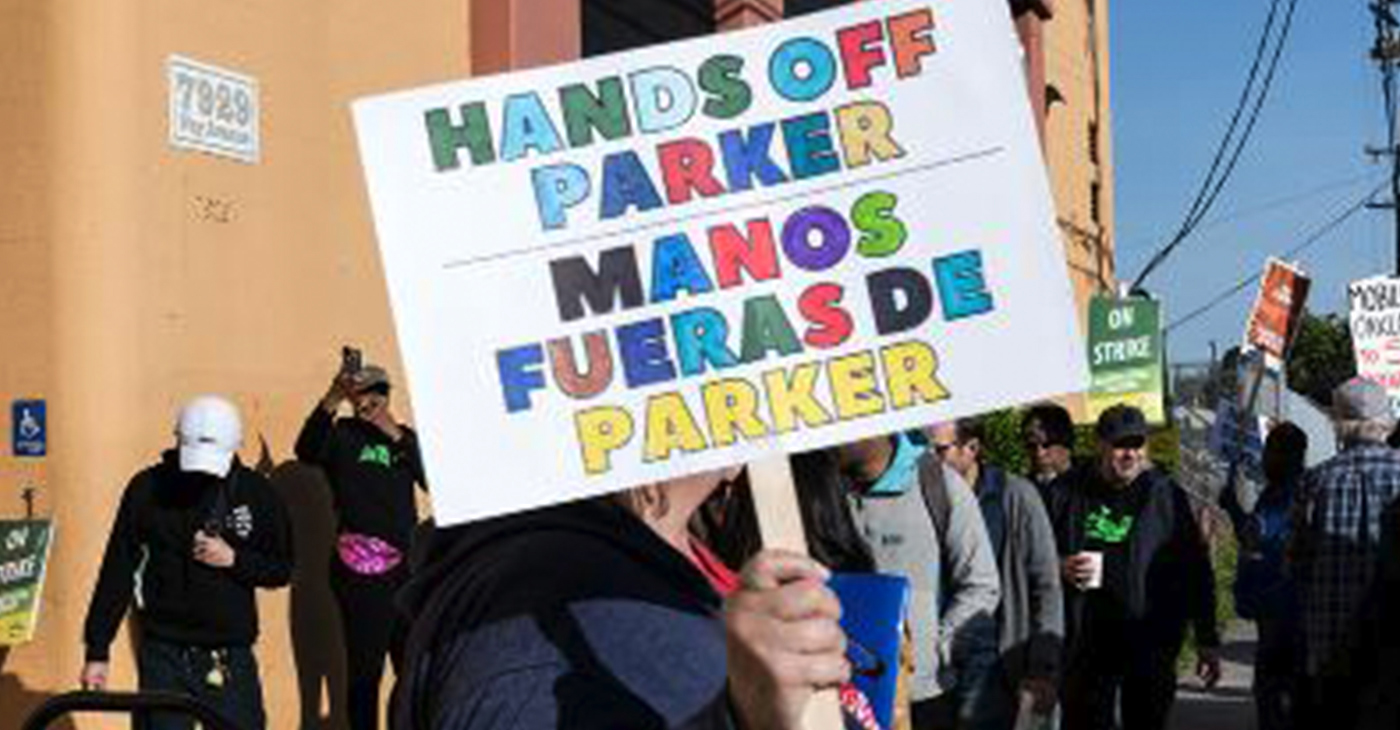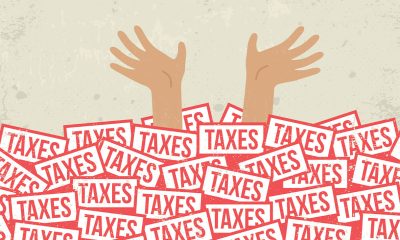Activism
COMMENTARY: Resistance to School Closings and Privatization Drives Candidacies in 2022 School Board Elections
Since the State took over the district in 2003, more than 30 schools have been closed, debts have soared and the ranks of high-paid outside consultants have burgeoned. While the closing of schools was justified as a path to financial stability, there has never been an accounting of the savings and there is always a new budget shortfall and a new list of schools to close.

By Ken Epstein | Post News Group
Heading into the Fall 2022 school board election season, the political atmosphere remains highly energized in the wake of the community-wide rebellion that started last year when the school board, directed by state officials and their representatives, pushed the Oakland Unified School District (OUSD) to close schools and dramatically cut school spending.
There are three seats that are up for election on the seven-member board. None of the incumbents, who backed the school closures, are running for re-election. There are a total of nine candidates, three in each of the three races. At least six of the candidates, two in each race, self-identify as progressives who are opposed to school closures and privatization.
The rebellion in the school community erupted in early 2022 after the school board approved the closure of 16 schools last school year and this year. Schools and communities responded with daily walkouts and marches, as well as citywide mass marches and rallies. Two staff members at Westlake Middle School held a prolonged hunger strike that captured international attention.
Joining the opposition, the Oakland City Council passed a resolution against the closings, as did the Alameda Labor Council and the Alameda County Board of Education.
Possibly in response to the pressure, the school closure list was reduced from 16 to 11. The decision to close some of the schools that were slated to close last year was postponed to this year, giving sites time to organize to save themselves. At least two schools, Westlake Middle and Prescott, were permanently removed from the closure list.
Ultimately, three schools were closed in June.
Opposition to school closures gained strength from a newfound alliance between rank-and-file teachers and longshore workers, members of ILWU Local 10, who formed a new organization, Schools and Labor Against Privatization (SLAP), has held joint actions against school closures and the City’s proposed giveaway of public land at the Port of Oakland to the Oakland A’s corporation.
In addition, community anger ended the political career of Alameda County Supt. Of Schools L. Karen Monroe, who was voted out of office in November. It was Monroe, as the front person for the state officials and the state-funded nonprofit Fiscal Crisis Management and Assistance Team (FCMAT), who threatened OUSD with direct takeover if it didn’t close schools and make budget cuts that officials were demanding.
Within these highly charged unfolding events, at least six progressive candidates have stepped up to oppose school closings and the privatization of schools and public resources.
The candidates are optimistic, speaking at various community forums, saying they have a chance in this election to swing the school board majority against privatization and closing more schools. They say a change in the balance of power on the board would make a dramatic change in Oakland’s educational leaders’ willingness to accept the decades-long dismantling of the public school system.
While hopeful that this is a moment for change, many school advocates have a sober estimate of what it will take to undo the damage done to Oakland schools by the onslaught of education privatizers that is devastating public education across the United States.
There is currently an understanding among many advocates that state Democratic leaders, who have operated through FCMAT and the County Office of Education at least since 2003, are deeply committed to an austerity agenda and not likely to back off simply because there is a new school board majority.
Many see that it will take a resolute and united school board, allied with a powerful citywide grassroots movement and community leaders with allies throughout the state to dislodge the colonial regime that dominates and drains the resources of OUSD.
Since the State took over the district in 2003, more than 30 schools have been closed, debts have soared and the ranks of high-paid outside consultants have burgeoned. While the closing of schools was justified as a path to financial stability, there has never been an accounting of the savings and there is always a new budget shortfall and a new list of schools to close.
At present, about 30% of Oakland students attend charter schools, many located at sites the district closed.
Speaking at a meeting with candidates organized by SLAP, several candidates emphasized the importance of electing a board that is connected to the community movement against closures and privatization.
“This is a moment — school closures have galvanized the entire community,” said District 6 candidate Valerie Bachelor. “We need to take (this) as an opportunity to really engage our community in a much deeper way, and this election is the way to do that. We need to get a super-majority to the school board so we can end this now and forever.”
Said District 4 candidate Pecolia Manigo, “Privatization is a much bigger agenda than just charters. (It’s about) real estate attempts to sell district properties (and) privatization in district contracts. There is an overuse of a lot of consultants and a lot of lawyers.”
“She said, “We’re trying to get four votes if not five” on the board. It’s about being clear about the moment we’re in, because we may not have this moment ever again.”
More news about the school board candidates and where they stand on issues will follow in coming weeks.
Activism
Gov. Newsom Approves $170 Million to Fast Track Wildfire Resilience
AB 100 approves major investments in regional conservancies across the state, including over $30 million each for the Sierra Nevada, Santa Monica Mountains, State Coastal, and San Gabriel/Lower LA Rivers and Mountains conservancies. An additional $10 million will support wildfire response and resilience efforts.

By Bo Tefu
California Black Media
With wildfire season approaching, last week Gov. Gavin Newsom signed Assembly Bill (AB) 100, unlocking $170 million to fast-track wildfire prevention and forest management projects — many of which directly protect communities of color, who are often hardest hit by climate-driven disasters.
“With this latest round of funding, we’re continuing to increase the speed and size of forest and vegetation management essential to protecting communities,” said Newsom when he announced the funding on April 14.
“We are leaving no stone unturned — including cutting red tape — in our mission to ensure our neighborhoods are protected from destructive wildfires,” he said.
AB 100 approves major investments in regional conservancies across the state, including over $30 million each for the Sierra Nevada, Santa Monica Mountains, State Coastal, and San Gabriel/Lower LA Rivers and Mountains conservancies. An additional $10 million will support wildfire response and resilience efforts.
Newsom also signed an executive order suspending certain regulations to allow urgent work to move forward faster.
This funding builds on California’s broader Wildfire and Forest Resilience Action Plan, a $2.7 billion effort to reduce fuel loads, increase prescribed burning, and harden communities. The state has also launched new dashboards to keep the public informed and hold agencies accountable.
California has also committed to continue investing $200 million annually through 2028 to expand this effort, ensuring long-term resilience, particularly in vulnerable communities.
Activism
California Rideshare Drivers and Supporters Step Up Push to Unionize
Today in California, over 600,000 rideshare drivers want the ability to form or join unions for the sole purpose of collective bargaining or other mutual aid and protection. It’s a right, and recently at the State Capitol, a large number of people, including some rideshare drivers and others working in the gig economy, reaffirmed that they want to exercise it.

By Antonio Ray Harvey
California Black Media
On July 5, 1935, President Franklin D. Roosevelt signed into federal law the National Labor Relations Act (NLRA). Also known as the “Wagner Act,” the law paved the way for employees to have “the right to self-organization, to form, join, or assist labor organizations,” and “to bargain collectively through representatives of their own choosing, according to the legislation’s language.
Today in California, over 600,000 rideshare drivers want the ability to form or join unions for the sole purpose of collective bargaining or other mutual aid and protection. It’s a right, and recently at the State Capitol, a large number of people, including some rideshare drivers and others working in the gig economy, reaffirmed that they want to exercise it.
On April 8, the rideshare drivers held a rally with lawmakers to garner support for Assembly Bill (AB) 1340, the “Transportation Network Company Drivers (TNC) Labor Relations Act.”
Authored by Assemblymembers Buffy Wicks (D-Oakland) and Marc Berman (D-Menlo Park), AB 1340 would allow drivers to create a union and negotiate contracts with industry leaders like Uber and Lyft.
“All work has dignity, and every worker deserves a voice — especially in these uncertain times,” Wicks said at the rally. “AB 1340 empowers drivers with the choice to join a union and negotiate for better wages, benefits, and protections. When workers stand together, they are one of the most powerful forces for justice in California.”
Wicks and Berman were joined by three members of the California Legislative Black Caucus (CLBC): Assemblymembers Tina McKinnor (D-Inglewood), Sade Elhawary (D-Los Angeles), and Isaac Bryan (D-Ladera Heights).
Yvonne Wheeler, president of the Los Angeles County Federation of Labor; April Verrett, President of Service Employees International Union (SEIU); Tia Orr, Executive Director of SEIU; and a host of others participated in the demonstration on the grounds of the state capitol.
“This is not a gig. This is your life. This is your job,” Bryan said at the rally. “When we organize and fight for our collective needs, it pulls from the people who have so much that they don’t know what to do with it and puts it in the hands of people who are struggling every single day.”
Existing law, the “Protect App-Based Drivers and Services Act,” created by Proposition (Prop) 22, a ballot initiative, categorizes app-based drivers for companies such as Uber and Lyft as independent contractors.
Prop 22 was approved by voters in the November 2020 statewide general election. Since then, Prop 22 has been in court facing challenges from groups trying to overturn it.
However, last July, Prop 22 was upheld by the California Supreme Court last July.
In a 2024, statement after the ruling, Lyft stated that 80% of the rideshare drivers they surveyed acknowledged that Prop 22 “was good for them” and “median hourly earnings of drivers on the Lyft platform in California were 22% higher in 2023 than in 2019.”
Wicks and Berman crafted AB 1340 to circumvent Prop 22.
“With AB 1340, we are putting power in the hands of hundreds of thousands of workers to raise the bar in their industry and create a model for an equitable and innovative partnership in the tech sector,” Berman said.
Activism
California Holds the Line on DEI as Trump Administration Threatens School Funding
The conflict began on Feb. 14, when Craig Trainor, acting assistant secretary for civil rights at the U.S. Department of Education (DOE), issued a “Dear Colleague” letter warning that DEI-related programs in public schools could violate federal civil rights law. The letter, which cited Title VI of the Civil Rights Act and the 2023 Supreme Court ruling in Students for Fair Admissions v. Harvard, which ended race-conscious admissions, ordered schools to eliminate race-based considerations in areas such as admissions, scholarships, hiring, discipline, and student programming.

By Joe W. Bowers Jr
California Black Media
California education leaders are pushing back against the Trump administration’s directive to dismantle diversity, equity, and inclusion (DEI) programs in its K-12 public schools — despite threats to take away billions in federal funding.
The conflict began on Feb. 14, when Craig Trainor, acting assistant secretary for civil rights at the U.S. Department of Education (DOE), issued a “Dear Colleague” letter warning that DEI-related programs in public schools could violate federal civil rights law. The letter, which cited Title VI of the Civil Rights Act and the 2023 Supreme Court ruling in Students for Fair Admissions v. Harvard, which ended race-conscious admissions, ordered schools to eliminate race-based considerations in areas such as admissions, scholarships, hiring, discipline, and student programming.
According to Trainor, “DEI programs discriminate against one group of Americans to favor another.”
On April 3, the DOE escalated the pressure, sending a follow-up letter to states demanding that every local educational agency (LEA) certify — within 10 business days — that they were not using federal funds to support “illegal DEI.” The certification requirement, tied to continued federal aid, raised the stakes for California, which receives more than $16 billion annually in federal education funding.
So far, California has refused to comply with the DOE order.
“There is nothing in state or federal law that outlaws the broad concepts of ‘diversity,’ ‘equity,’ or ‘inclusion,’” wrote David Schapira, California’s Chief Deputy Superintendent of Public Instruction, in an April 4 letter to superintendents and charter school administrators. Schapira noted that all of California’s more than 1,000 traditional public school districts submit Title VI compliance assurances annually and are subject to regular oversight by the state and the federal government.
In a formal response to the DOE on April 11, the California Department of Education, the State Board of Education, and State Superintendent of Public Instruction Tony Thurmond collectively rejected the certification demand, calling it vague, legally unsupported, and procedurally improper.
“California and its nearly 2,000 LEAs (including traditional public schools and charter schools) have already provided the requisite guarantee that its programs and services are, and will be, in compliance with Title VI and its implementing regulation,” the letter says.
Thurmond added in a statement, “Today, California affirmed existing and continued compliance with federal laws while we stay the course to move the needle for all students. As our responses to the United States Department of Education state and as the plain text of state and federal laws affirm, there is nothing unlawful about broad core values such as diversity, equity and inclusion. I am proud of our students, educators and school communities who continue to focus on teaching and learning, despite federal actions intended to distract and disrupt.”
California officials say that the federal government cannot change existing civil rights enforcement standards without going through formal rule-making procedures, which require public notice and comment.
Other states are taking a similar approach. In a letter to the DOE, Daniel Morton-Bentley, deputy commissioner and counsel for the New York State Education Department, wrote, “We understand that the current administration seeks to censor anything it deems ‘diversity, equity & inclusion.’ But there are no federal or State laws prohibiting the principles of DEI.”
-

 Activism4 weeks ago
Activism4 weeks agoOakland Post Endorses Barbara Lee
-

 Activism3 weeks ago
Activism3 weeks agoOakland Post: Week of April 2 – 8, 2025
-

 #NNPA BlackPress3 weeks ago
#NNPA BlackPress3 weeks agoTrump Profits, Black America Pays the Price
-

 Activism2 weeks ago
Activism2 weeks agoOakland Post: Week of April 9 – 15, 2025
-

 #NNPA BlackPress3 weeks ago
#NNPA BlackPress3 weeks agoHarriet Tubman Scrubbed; DEI Dismantled
-

 #NNPA BlackPress3 weeks ago
#NNPA BlackPress3 weeks agoTrump Targets a Slavery Removal from the National Museum of African-American History and Culture
-

 #NNPA BlackPress3 weeks ago
#NNPA BlackPress3 weeks agoLawmakers Greenlight Reparations Study for Descendants of Enslaved Marylanders
-

 #NNPA BlackPress3 weeks ago
#NNPA BlackPress3 weeks agoNew York Stands Firm Against Trump Administration’s Order to Abandon Diversity in Schools























































